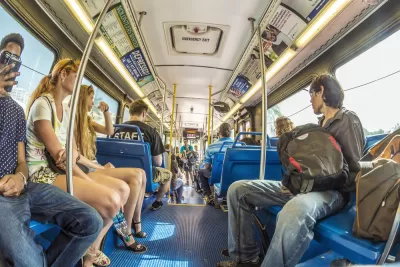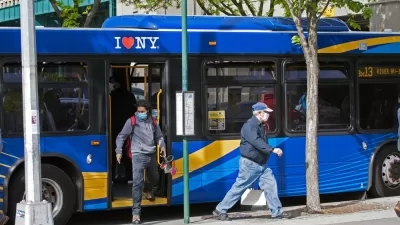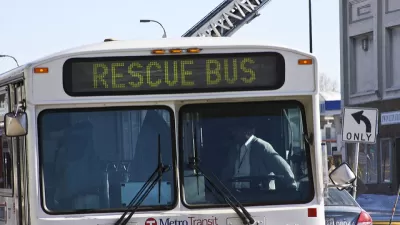An investigation of passenger complaints provides the starting point for an in-depth investigation of the service provided by Florida's largest transit system.

Douglas Hanks shares the findings on an investigation by the Miami Herald into customer complaints about the Miami-Dade Metrobus system. Requesting all complaints from bus passengers since the start of 2014, Hanks reports that through July of 2015, "there were nearly 27,000 [complaints] registered via email, online and call center. That’s roughly 47 per day, offering the most detailed look available at what irks, enrages and horrifies the system’s 210,000 daily passengers."
Among the complaints are horror stories involving cockroaches, a driver eating out of a cup with a spoon while operating the bus, and a bus route that routinely arrives 45 minutes late to deliver one man to work.
The Miami-Herald has also created an interactive database of "Bus Gripes," where interested transit observers can sort through specific complaints and compare the rating achieved by each of the system's routes.
Mayor Carlos Gimenez, who is up for re-election next year, "has pledged to usher in an era of cleaner and more efficient buses," according to Hanks. But critics of the mayor credit years of chronic underfunding for the current state of the system. Hanks also provides these details about Gimenez's goals for transit funding: "Gimenez restored Transit’s increase this year but has also pledged to end the agency’s current $100 million operating subsidy from transportation taxes by 2020. Backed by a county oversight board and other leaders who endorse the shift, Gimenez wants the operation subsidies spent on Transit projects included in the 2002 [sic] plan. The county’s budget forecasts hinge on an expanding economy should providing enough dollars in transit to make up for the lost sales tax money."
The article includes a lot more, in-depth reporting on the state of the system and the politics of transportation in Miami.
FULL STORY: On the bus in Miami-Dade, and not happy about it

Alabama: Trump Terminates Settlements for Black Communities Harmed By Raw Sewage
Trump deemed the landmark civil rights agreement “illegal DEI and environmental justice policy.”

Study: Maui’s Plan to Convert Vacation Rentals to Long-Term Housing Could Cause Nearly $1 Billion Economic Loss
The plan would reduce visitor accommodation by 25% resulting in 1,900 jobs lost.

Why Should We Subsidize Public Transportation?
Many public transit agencies face financial stress due to rising costs, declining fare revenue, and declining subsidies. Transit advocates must provide a strong business case for increasing public transit funding.

Paris Bike Boom Leads to Steep Drop in Air Pollution
The French city’s air quality has improved dramatically in the past 20 years, coinciding with a growth in cycling.

Why Housing Costs More to Build in California Than in Texas
Hard costs like labor and materials combined with ‘soft’ costs such as permitting make building in the San Francisco Bay Area almost three times as costly as in Texas cities.

San Diego County Sees a Rise in Urban Coyotes
San Diego County experiences a rise in urban coyotes, as sightings become prevalent throughout its urban neighbourhoods and surrounding areas.
Urban Design for Planners 1: Software Tools
This six-course series explores essential urban design concepts using open source software and equips planners with the tools they need to participate fully in the urban design process.
Planning for Universal Design
Learn the tools for implementing Universal Design in planning regulations.
Smith Gee Studio
Alamo Area Metropolitan Planning Organization
City of Santa Clarita
Institute for Housing and Urban Development Studies (IHS)
City of Grandview
Harvard GSD Executive Education
Toledo-Lucas County Plan Commissions
Salt Lake City
NYU Wagner Graduate School of Public Service




























